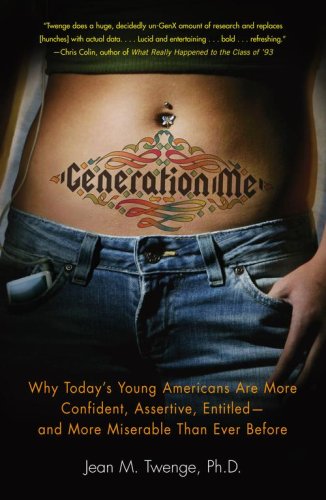All Nonfiction
- Bullying
- Books
- Academic
- Author Interviews
- Celebrity interviews
- College Articles
- College Essays
- Educator of the Year
- Heroes
- Interviews
- Memoir
- Personal Experience
- Sports
- Travel & Culture
All Opinions
- Bullying
- Current Events / Politics
- Discrimination
- Drugs / Alcohol / Smoking
- Entertainment / Celebrities
- Environment
- Love / Relationships
- Movies / Music / TV
- Pop Culture / Trends
- School / College
- Social Issues / Civics
- Spirituality / Religion
- Sports / Hobbies
All Hot Topics
- Bullying
- Community Service
- Environment
- Health
- Letters to the Editor
- Pride & Prejudice
- What Matters
- Back
Summer Guide
- Program Links
- Program Reviews
- Back
College Guide
- College Links
- College Reviews
- College Essays
- College Articles
- Back
Generation Me
Generation Me, by Jean Twenge, explores the generation of people born post 1970 and how they have come to hold the importance of the individual above all. The book also takes a look at the cultural influences that have impacted the Gen Me's lives, relationships, successes and failures. By using examples such as modern society and pop culture, Twenge presents a thought provoking but slightly lackluster definition of the age bracket that is Generation Me.
Throughout the book, it was interesting to read about the cultural shifts that lead to Generation Me including the importance of self esteem the rooted from the 1970's. Prior to this, children were trained to be seen but not heard. But in the seventies, when parents began to promote their kids to grow up to be confident individuals, they encouraged kids to be 'seen and heard coincidentally teaching kids that their wants and needs are most important' (Twenge 75). A section that particularly fueled my interest in the novel was the section regarding Gen Me and religion showing Gen me is far less concerned in organized religion and more interested in 'highly individualized make-your-own-religions' (Twenge 35). I was in truth surprised to discover Ɖ out of 4 Catholics said that were more likely to follow their own conscience on difficult moral questions rather than follow the teachings of Pope Benedict' (Twenge 35).
My most fascinating finding in reading Generation Me was how well my friends and I fit Twenge's portrayal of Gen Me. We make every effort to be diverse and ignore authority thinking we contain all the answers; we put aside cares for others to focus exclusively on ourselves. We struggle to pursue our dreams and live by the statement, 'As long as I believe in my self, I really do not care what others think' (Twenge 19), but at the end of the day we have a lot of fun. Despite this, Twenge repeatedly called Gen Me the most miserable generation ever finding 'generational differences have significant influence on levels of anxiety and stress' (Twenge 109) which left me feeling uncomfortable and thinking it's all downhill from this point on. The real world is not a pleasurable place. It is filled with dissatisfaction, solitude and dejection. But every generation prior has had to face truth sooner or later and they have turned out okay. Twenge judges Gen Me to be a vain, self absorbed, narcissistic and miserable age group bestow the book a portentous feel and slow the pace of the story significantly.
Overall, Generation Me by Jean M. Twenge, Ph.D. is thought provoking but dull. However, Twenge does closeout the book optimistically with the advice that "Generation Me needs realistic expectations, careful career guidance, and assistance when we become parents. In return, we will gladly lend our energy and ambition toward our work and toward helping others' (Twenge 242).
Similar Articles
JOIN THE DISCUSSION
This article has 0 comments.

